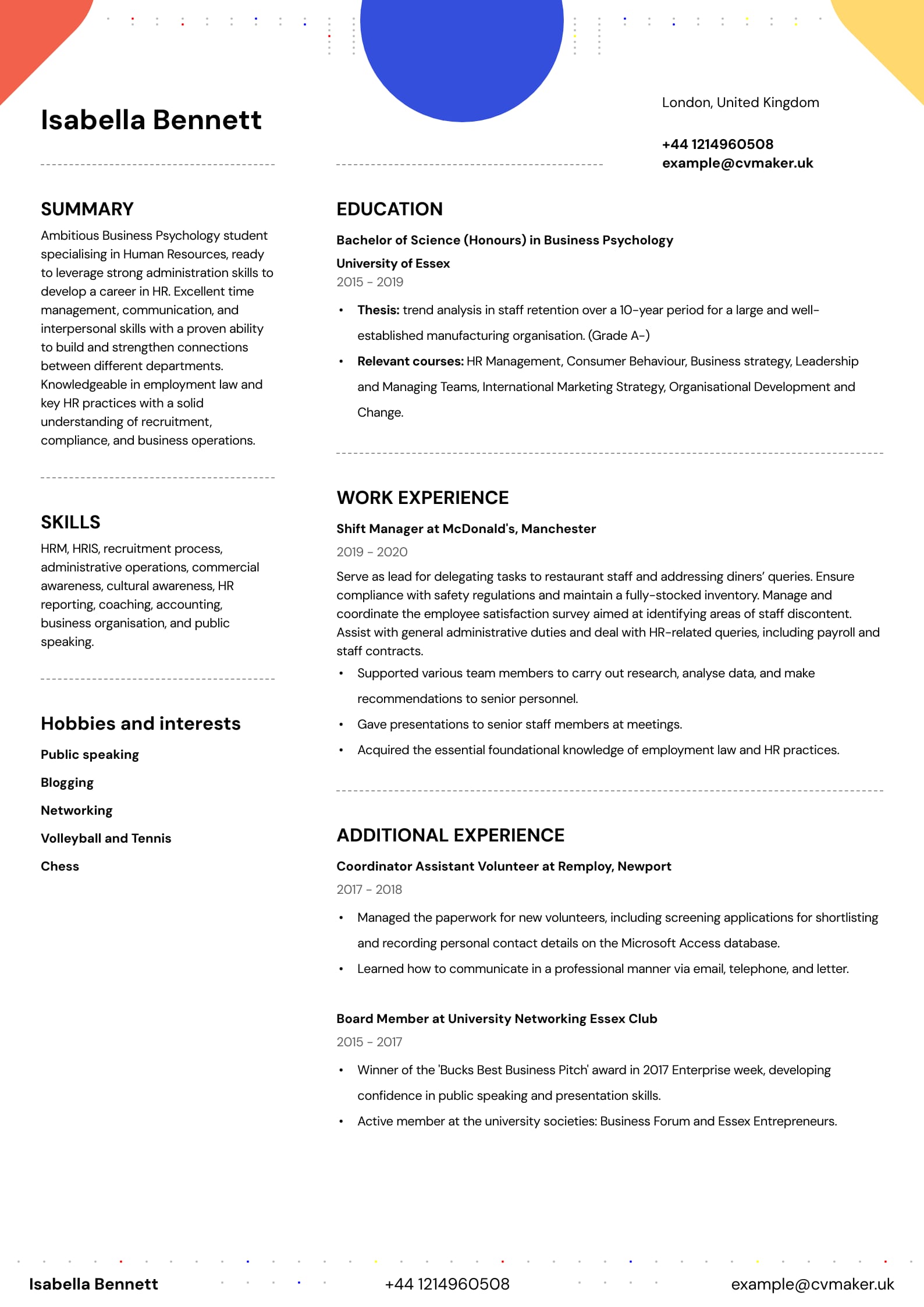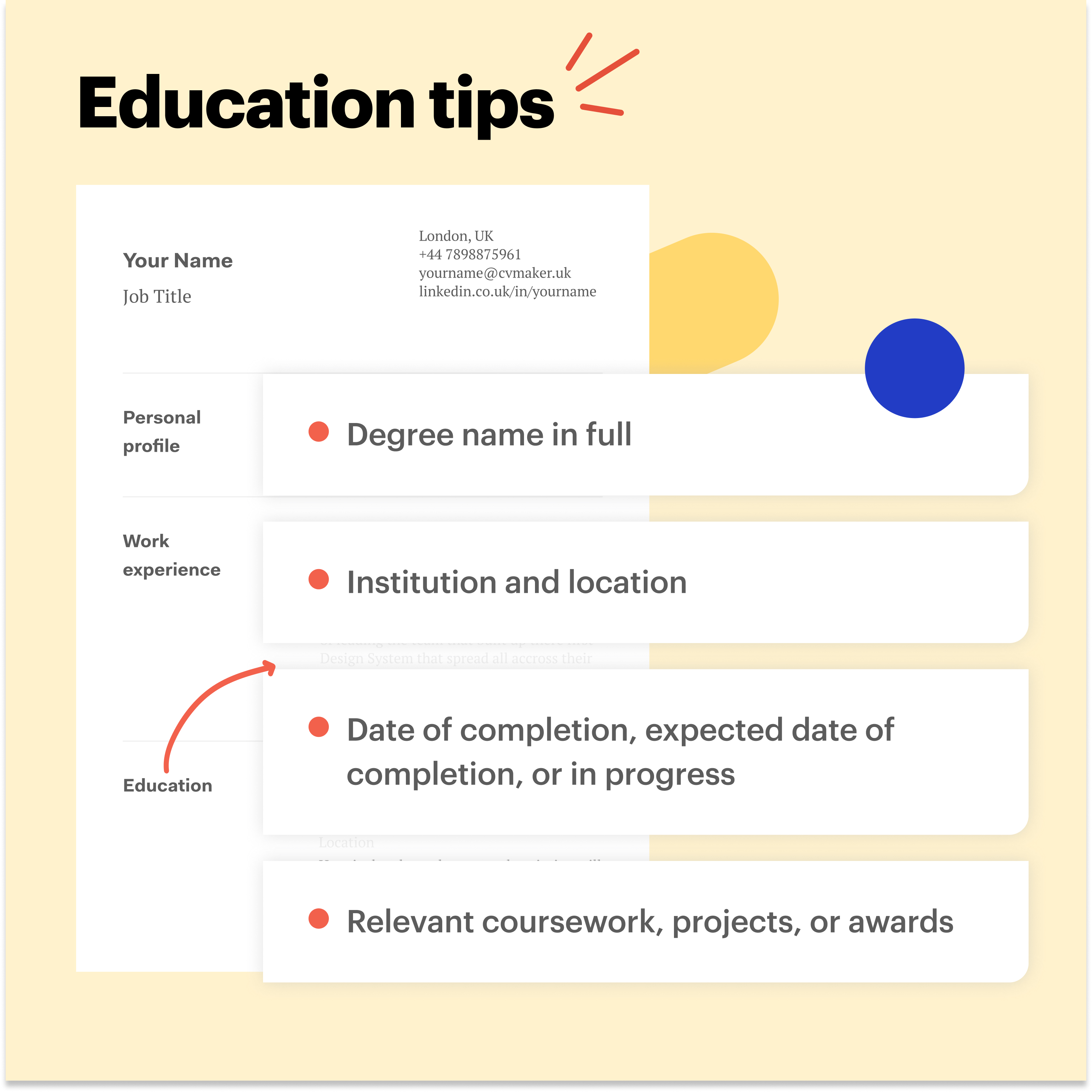Everyone’s educational journey is unique, and not everyone has formal tertiary qualifications. Depending on your background, there are different ways to present your education on a CV to best highlight your experience and skills.
In this article, we cover:
Different ways for presenting education on a CV.
How to put your degree on a CV.
Examples of how to highlight your education
Strategies for when you lack formal qualifications or education
Tips for including information if you’re currently studying, and more!
CV and Cover Letter Builder
Effortlessly create a professional CV or cover letter
Easy to use on any device
Integrated spelling and grammar check
Customisable job-specific examples

4 scenarios on how to list education on a CV
The placement and format of the education section on your CV should reflect your career stage. For more tips, refer to the below ways in which you can place it on your CV.
1: You only completed high school or are a recent school leaver
If you’ve only completed high school or are a recent graduate, it’s important to place your education near the top of your CV, especially if you don’t have much work experience yet. You can emphasise any relevant coursework, extracurricular activities, or awards that demonstrate skills applicable to the job you’re applying for.
2: You have a bachelor's degree
For those with a bachelor’s degree, this should be listed clearly in the education section, typically after your work experience. Include the degree title, the institution where you studied, and the graduation year. If your degree is directly relevant to the role, consider providing more details on key modules, projects, or honours.
3: You hold multiple degrees (Bachelor's and Master’s)
When you have more than one degree, list them in reverse chronological order, starting with the most recent qualification. You might also choose to highlight the degree most relevant to the job first. If you hold a master’s degree, consider including your dissertation or thesis title if relevant to the position.
4: You are self-taught through courses and practical experience
If you’re self-taught or have gained education through online courses, certifications, or practical experience, don’t hesitate to create an education section that reflects this. List relevant courses, certifications, and skills learned, ensuring they align with the role you’re applying for. For more tips, refer to how to add courses and certficates on a CV.
Pro Tip
Highlight practical experience by including projects or work you've completed through self-directed learning. This showcases your initiative and hands-on skills.
For more information on other CV sections, refer to our cornerstone article on how to write a good CV.
How to write education in CV
The UK offers a variety of qualifications beyond traditional academic routes. This includes vocational education, technical qualifications, and apprenticeships, each of which can be listed on a CV in a way that highlights your specific skills and experience.

Vocational education:
Practical skills and knowledge related to specific industries or professions.
Often involve hands-on training and assessments, leading to vocational qualifications like BTECs (Business and Technology Education Council) or City and Guilds.
Can lead to apprenticeships, employment, or further study in related fields.
Examples: Courses in hairdressing, plumbing, automotive mechanics, or hospitality.
For the above examples, refer to the below CV writing guides:
Other education options in the UK:
General Certificate of Secondary Education (GCSE): The main qualification taken by students at age 16, covering a wide range of subjects.
A-Levels: Advanced-level qualifications taken by students at age 18, typically required for university admission. These are the most common pre-university qualifications in the UK and are often listed on CVs.
Technical Qualifications: Similar to vocational qualifications but often involve a higher level of academic study, such as BTECs at Level 3 or National Vocational Qualifications (NVQs).
University Education: This includes traditional academic degrees such as Bachelor's, Master's, and Doctoral degrees. In the UK, degrees are commonly abbreviated (e.g., BA for Bachelor of Arts, BSc for Bachelor of Science, MA for Master of Arts). Additionally, UK degrees often include honours classifications (such as First Class, Upper Second Class, Lower Second Class, etc.), which are frequently noted on CVs.
Education section CV examples
A-levels on a CV:
A-Levels: English Literature (A), History (B), French (C), St. Paul's School, London, UK, 2021
Undergraduate degree on a CV:
Bachelor of Arts (BA) in English Literature, University of Oxford, UK, 2023
Upper second-class honours
Relevant coursework: Shakespearean Studies, Victorian Literature
Postgraduate on a CV:
Master of Science (MSc) in Machine Learning, Imperial College London, UK | 2025
For more information on the different qualification levels, refer to the 9 qualification levels in England, Wales, and Northern Ireland. As for Scotland, refer to the Scottish Credit and Qualifications Framework. Alternatively, if you are looking for a job in Europe, refer to our guide on the Europass CV.
5 steps on how to format education on CV
The format and structure of your CV's education section are essential for presenting your qualifications clearly and efficiently. A well-organised education section not only makes it easier for recruiters to evaluate your background but also enhances compatibility with Applicant Tracking Systems (ATS), increasing your chances of progressing to the next stage. To craft an effective education section, follow these guidelines:
Start with your most recent degree and work backwards to the earliest.
Provide the name of the institution, the degree you earned, and your field of study.
Mention the dates of your education, ideally by year, especially if obtained within the last 10-15 years.
Include any coursework that is pertinent to the job you are applying for.
Note any scholarships, academic awards, or research grants you received.
Where to place education on a CV
The format and placement of the education section can vary based on your background and what you wish to highlight. There is no universal approach, and traditional formatting may not suit every career path.
Recent graduates should typically place their education at the top of their CVs.
Experienced professionals can move education below work experience, especially if the latter is more relevant to the job.
Non-traditional learners, or those without formal qualifications, can focus on relevant courses, certifications, and skills instead of traditional education.
How to format a CV with no education
If you do not have formal or tertiary education to include on your CV, you can still showcase your skills, experience, and qualifications. Keep the section heading “Education" and place either your secondary education or relevant courses/professional training. Addition tips include:
Highlight relevant work experience, internships, apprenticeships, or vocational training. Include any relevant certifications or qualifications earned outside of formal education.
Format your CV to highlight strengths and transferable skills, such as communication, teamwork, problem-solving, and leadership abilities.
Consider using a skills-based CV format if you have no work experience.
List volunteer work, personal projects, or extracurricular activities demonstrating skills and qualifications.
For additional tips, check out our guides on CV for a first job or how to write a CV with no experience.
Key takeaways
Only include the most important information about your education, such as the degree earned, institution, and date of graduation. If you have multiple degrees, only include the most recent one(s) or the one(s) relevant to the job.
If you earned any awards, honours, or special recognitions during your education, include them in your education section.
Only include courses if relevant to the position you're applying for.
Ensure your education section's formatting is consistent with the rest of your CV.
Next steps?
If you're seeking assistance with updating your CV, we recommend exploring our CV Writing Service with a team of experts who can help you craft a compelling and professionally polished CV or simple cover letter. Additionally, we offer a diverse collection of over 20 professional templates designed to seamlessly complement your CV.
FAQs
What would I include for education if I recently graduated from university?
Firstly, place your education section at the top of your CV to highlight your recent academic achievements. Secondly, mention your recent graduate status in your profile to draw attention to your fresh qualifications. These strategies will effectively showcase your educational background and ensure that it receives proper emphasis in your CV. Refer to our student or graduate CV examples and writing guides for inspiration.
How can I address poor grades on my academic record?
If you have other achievements, such as extracurricular activities, hobbies, volunteer experience, or work experience, focus on those in your CV. Additional tips include:
Instead of emphasising your grades, focus on the skills you gained during your education, such as research, writing, or analytical skills.
Emphasise an essay or exam in which you performed exceptionally well to showcase specific areas of the course where you excelled, even if your overall grade does not fully reflect it.
Provide an example of how you managed to improve your grades over time.
How often should I update my education information?
There is no set timeline for updating your education information on your CV, but it's important to keep it current and relevant to your career aspirations. You should try to update your education information on your CV or LinkedIn whenever you complete a new qualification or training course.
Do you put a degree or qualification in progress on a CV?
Yes, it is important to include any course or type of qualification, even if it is in progress since it shows your ability to multitask.

)



)

